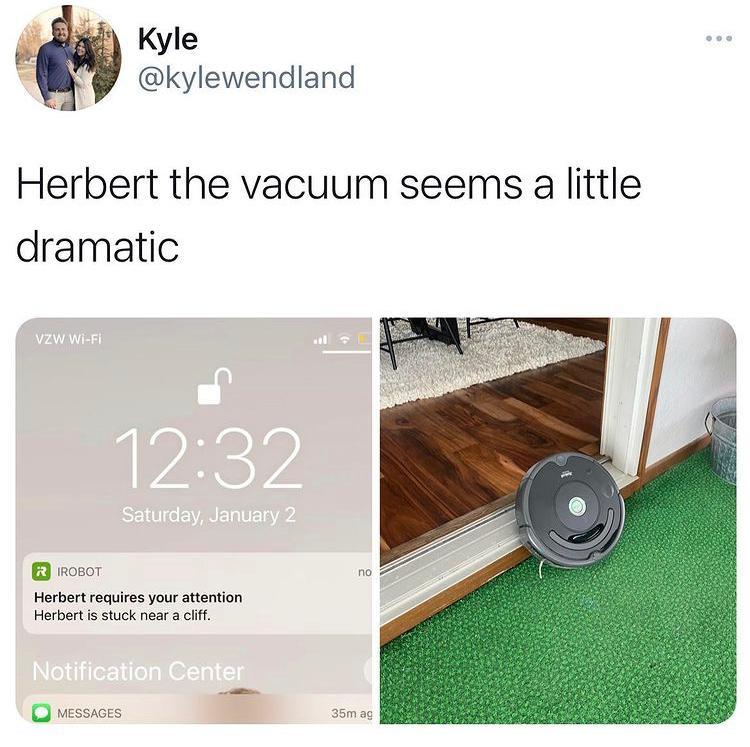The internet of things
The ‘internet of things’ is a collective noun for devices connected to the internet, so called ‘smart devices’. What makes a device ‘smart’? There are a few requirements: Is the device connected to Wi-Fi of Bluetooth? Can I operate the device with my smartphone? Does the device show current information, for example the weather at your current location? Does the device talk back? Does the device recognise persons or their own name? If you answered ‘yes’ to most of these questions, it is probably a smart device. Now you might think that this means that a lot of devices and systems are part of the internet of things, or at least, that is what I thought. These devices range from security cameras to robot vacuum cleaners (you might have heard of the Roomba before) to fridges that tell you when your beer is finally cold enough. But it is even bigger than that, industrial facilities often utilise the internet of things for water quality management, ultraviolet radiation monitoring, flood alerts, or patient surveillance in hospitals. Even these examples offer only a partial picture of the enormous potential of the internet of things.
Advantages of the internet of things
The advantages of the internet of things are enormous. Whether we like it or not, without human intervention, machines are able to communicate and exchange information way faster and way more efficient because of their interconnectivity. As we all know in today’s modern life, time is money and money is time. For companies and businesses this mostly means cost reduction, better efficiency and productivity, more business opportunities, and better mobility and agility. Life without the internet of things is pretty much unimaginable in the modern western world. From smart farming systems, automated transportation, water distribution, urban security, and healtycare systems in hospitals. Even as an individual, smart devices can help you to live more efficiently when it comes to energy and water usage, food spillage, saving money and time in the long run. Not to mention it can be quite funny, for example: smart wine bottles that depict how many glasses of wine you have remaining (for those too bougjee to look at the actual bottle), or a smart dental floss that keeps up with your flossing habits.

Disadvantages of the internet of things
However, with such great advantages come disadvantages as well. Because more smart appliances exist, they have become new and more targets for hackers. So whats the harm in hacking my Roomba? Do these criminals not like the idea of my floor being clean? Not quite, a lot of smart devices along with vacuums and fridges have cameras to also function as security cameras. Hackers can spy on you and your house and blackmail you with information or photos takes via these cameras. Even more severe, there have been cases of hackers taking over smart cars or hoverboards while in traffic. Even pacemakers are linked up to the internet, meaning that these could also be hacked. These devices get hacked relatively easily because companies that do not specialise in cyber security, usually also do not really care for cybersecurity. Their goal is to make and sell products, not make their products as safe as possible in the online environment. If one of your devices gets hacked, other devices connected to the same Wi-Fi network become at lot more vulnerable, even your adequately secured smartphone or laptop. This means that rather quickly, all your smart devices containing maybe private or sensitive information will be vulnerable to hacking. This interconnectivity becomes an even bigger problem when industrial or governmental facilities get attacked. Ofcourse these facilities have way better cyber security, but when they get hacked the impact is also a lot more devastating. If water qualitity management, smart farming machines, logistic networks, etc. get hacked, desatrous damage might be inflicted on persons or maybe even a whole country. This is recognised as the usage of a cyber weapon. Some experts predict in the future, cyberweapons will be the new focus in fighting wars: taking down a country’s water quality management or farming systems might inflict more damage in the long run than any gun will ever be able to.
Conclusion
Nowadays, society is incredibily intertwined with the internet, and consequently the internet of things. With great advantages come great disadvantages, however I am not trying to take a stance on the matter. I think it is amazing how far the internet of things reaches, however I do think for the future, better cyber security is needed.
Sources
Analytics Vidhya. (2016, 26 august). 10 Real World Applications of the Internet of Things (IoT) – Explained in Videos. https://www.analyticsvidhya.com/blog/2016/08/10-youtube-videos-explaining-the-real-world-applications-of-internet-of-things-iot/
Coward, J. (2018, 19 february). Funny IoT Devices: Is This the Worst of the Internet of Things? https://www.iotworldtoday.com/2018/02/19/funny-iot-devices-worst-internet-things/
Gibney, A. (Director). (2016). Zero Days [Documentary].
Lindsay, J. R. (2013). Stuxnet and the Limits of Cyber Warfare. Security Studies, 22(3), 365-404.
The Chartered Institute for IT BCS. (2017). The internet of things: Living in a connected world (1st ed.).
Van der Hof, S., Lodder, A., & Zwenne, G. (2014). Recht en Computer. Kluwer.
Verlaan, D. (2020). Ik weet je wachtwoord. Das Mag Uitgevers.



Recent Comments